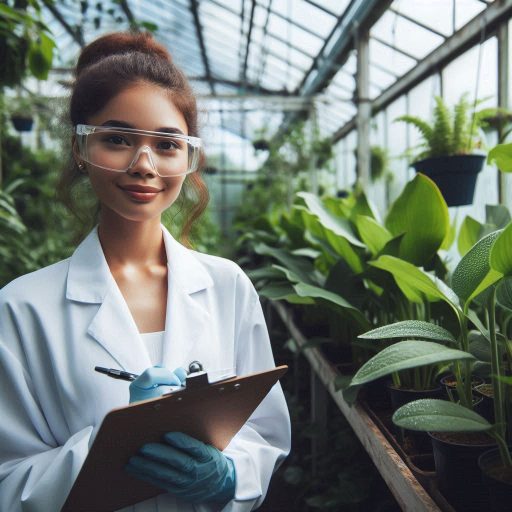Introduction
Plant science is essential in agriculture, environmental conservation, and biotechnology.
It focuses on understanding plants to improve crop production and sustainability.
Plant scientists help solve global challenges like food security and climate change, making their work crucial for various industries.
The demand for professionals in plant science careers is growing rapidly.
As populations increase, there is a greater need for sustainable agriculture and environmental restoration.
Companies and organizations seek skilled plant scientists to develop innovative solutions for these global issues.
This increasing demand creates vast opportunities for those entering the field.
The purpose of this blog post is to discuss the top skills needed for a successful career in plant science.
We will explore the scientific, analytical, and technical abilities that are essential for excelling in this field.
Additionally, we will highlight the importance of communication and collaboration skills, as plant scientists often work in interdisciplinary teams.
By developing these key skills, aspiring plant scientists can navigate complex challenges in agriculture and conservation.
In the following sections, we will provide detailed insights into the most critical competencies for this career path, helping you build a strong foundation for success in plant science.
Understanding of plant biology
The Importance of a Strong Foundation in Plant Biology
A strong foundation in plant biology is essential for a successful career in plant science.
Plant biology forms the core of understanding how plants function, grow, and interact with their environment.
Plant scientists must possess a thorough knowledge of plant biology to solve agricultural and ecological challenges.
This foundation helps professionals understand plant responses to stress, nutrient uptake, and adaptation to various climates.
A deep understanding of plant biology enables scientists to conduct meaningful research and contribute to crop improvement.
It also supports innovations in biotechnology, such as developing drought-resistant plants or enhancing nutritional content.
Without this essential knowledge, a plant scientist may struggle to make informed decisions about plant management and research.
Basic Concepts of Plant Physiology, Taxonomy, and Genetics
Understanding the basic concepts of plant physiology, taxonomy, and genetics is crucial for any plant scientist.
Plant physiology focuses on the vital processes that keep plants alive, including photosynthesis, respiration, and transpiration.
A solid grasp of plant physiology allows scientists to explore how environmental factors influence plant growth and survival.
Taxonomy, the classification of plants, is another important area of plant science.
It helps scientists organize and identify plant species, ensuring accurate research and data collection.
Proper identification of plants is essential for conservation efforts, plant breeding, and ecosystem management.
Genetics is equally important for plant scientists, as it explains how traits are inherited in plants.
Plant geneticists use this knowledge to improve crop varieties, making them more resilient to diseases and pests.
Understanding genetics also opens doors to biotechnology and genetic engineering, where scientists can manipulate plant genomes to enhance agricultural production.
The combination of physiology, taxonomy, and genetics gives plant scientists the tools needed to address both current and future challenges in agriculture and conservation.
Expertise in Plant Anatomy and Morphology
Expertise in plant anatomy and morphology is another critical skill for plant scientists.
Plant anatomy refers to the internal structure of plants, including tissues, cells, and organs.
Plant scientists must understand how different parts of a plant function together to ensure proper growth.
Knowledge of plant anatomy is essential when diagnosing diseases, understanding plant health, or improving plant yields.
Morphology, the study of plant form and structure, is also essential for plant scientists.
By examining the shapes, sizes, and forms of plants, scientists can understand how plants adapt to their environments.
Morphology helps scientists identify plant species and understand their evolutionary history.
It also plays a role in understanding plant-pollinator interactions, which is vital for ecosystem sustainability.
A thorough understanding of plant anatomy and morphology enables plant scientists to make precise observations in the field or lab.
This expertise is fundamental in research, particularly when studying plant development, plant breeding, or ecological restoration efforts.
A successful career in plant science requires a strong foundation in plant biology, along with knowledge of plant physiology, taxonomy, and genetics.
Additionally, expertise in plant anatomy and morphology is crucial for addressing key challenges in agriculture, ecology, and biotechnology.
Together, these skills equip plant scientists with the knowledge and tools needed to make meaningful contributions to the field of plant science and improve global food security.
Read: U.S. Cities with the Most Opportunities for Environmental Scientists
Research and analytical skills
The Importance of Research and Analytical Skills in Plant Science
Research and analytical skills are fundamental for a successful career in plant science.
Plant scientists constantly investigate various aspects of plant biology, ecology, and genetics.
These skills allow professionals to solve complex agricultural, environmental, and biological problems.
Being able to conduct thorough research is essential for developing new plant varieties or improving crop resistance.
Plant scientists often work with large datasets and need strong analytical skills to make sense of that data.
Interpreting research findings helps them understand plant behaviors, disease resistance, and responses to environmental changes.
These skills are crucial whether you’re conducting experiments in a laboratory or studying plants in their natural environment.
By mastering research and analysis, you can contribute valuable knowledge to the plant science field.
The Ability to design and conduct experiments, analyze data, and draw conclusions.
Designing and Conducting Experiments
Plant scientists must be skilled in designing and conducting experiments.
Experimentation is at the heart of plant science research.
Whether studying plant genetics, growth patterns, or responses to stress, you need to develop effective experiments that answer scientific questions.
Good experimental design involves creating clear, testable hypotheses and ensuring the methods used are reliable and repeatable.
Plant scientists must also know how to control variables and ensure accurate results.
Once the experiments are set up, you must follow through with careful observation and documentation.
Recording every detail accurately is essential for drawing valid conclusions.
This process builds the foundation for meaningful research outcomes, which can influence agricultural practices, environmental policy, or biodiversity conservation.
Analyzing Data and Drawing Conclusions
After conducting experiments, the ability to analyze data and draw conclusions is essential.
Plant scientists often deal with complex data sets, which may include measurements of growth rates, genetic sequences, or environmental conditions.
You must know how to interpret this data to draw meaningful insights.
Data analysis tools, such as statistical software, help plant scientists make sense of their findings.
Learning how to use these tools is important for processing and evaluating experimental results.
Once the data is analyzed, you must interpret what it means in relation to the research question.
Drawing logical, evidence-based conclusions is essential for making informed decisions in plant science.
These conclusions can guide future research, improve agricultural techniques, or inform environmental conservation strategies.
Staying Updated with the Latest Research
Plant science is a rapidly evolving field, making it crucial for scientists to stay updated with the latest research.
Advancements in genetics, biotechnology, and environmental science constantly shape the discipline.
Reading scientific journals, attending conferences, and participating in workshops can help you keep pace with new discoveries.
Being aware of current trends allows plant scientists to apply cutting-edge knowledge to their work.
Staying updated also ensures that you use the most effective techniques and technologies available.
Networking with other researchers and participating in collaborative projects also provide valuable opportunities to learn and grow in the field.
To succeed in a plant science career, mastering research and analytical skills is essential.
The ability to design and conduct experiments, analyze data, and draw meaningful conclusions is critical.
Staying updated with the latest research trends further enhances your effectiveness.
By developing these core skills, you can contribute significantly to the growing field of plant science.
Read: Environmental Scientist vs. Ecologist: Roles and Differences in the US
Problem-solving Abilities
The Importance of Problem-Solving Skills in Plant Science
Problem-solving is one of the most critical skills for a successful career in plant science.
Plant scientists regularly face complex challenges that require quick thinking and innovative approaches.
Whether it’s improving crop yields or combating diseases, effective problem-solving drives progress in this field.
Strong problem-solving skills enable plant scientists to analyze situations, identify key issues, and implement solutions.
It involves breaking down complex problems into manageable parts, allowing scientists to develop targeted strategies.
In a rapidly changing world, plant scientists must adapt and respond to new challenges effectively.
By refining problem-solving abilities, plant scientists can contribute to advancements in agriculture and environmental sustainability.
These skills are crucial in ensuring that future generations have access to nutritious food and a healthy planet.
Identifying and Addressing Challenges in Plant Growth
A plant scientist’s job often involves identifying and addressing specific challenges in plant growth.
Environmental stresses such as drought, extreme temperatures, and soil degradation can severely impact crop productivity.
Scientists must be able to quickly diagnose the factors limiting growth and find ways to mitigate these stresses.
Diseases are another major challenge in plant science.
Plant scientists must stay vigilant to recognize early signs of infection or infestation.
They need to work proactively to prevent widespread damage.
Having a keen eye for detail and a deep understanding of plant biology helps in detecting subtle issues before they escalate.
Addressing these challenges involves a combination of fieldwork, lab research, and data analysis.
Plant scientists must be comfortable conducting experiments, collecting data, and interpreting results.
Their ability to identify the root causes of growth issues ensures effective interventions.
Innovative Solutions for Crop Productivity and Sustainability
Innovation is key to solving the global food security challenges we face today.
Plant scientists must find creative solutions to improve crop productivity while ensuring sustainability.
This requires the ability to think outside the box and adopt new techniques that balance both environmental and agricultural needs.
Scientists might develop new plant varieties that can withstand environmental stresses or use biotechnology to enhance disease resistance.
They may also implement precision agriculture techniques that optimize resource use while minimizing waste.
The goal is to increase yields without depleting natural resources, ensuring long-term agricultural success.
Sustainability is increasingly important in the field of plant science.
Plant scientists must consider the broader ecological impact of their work.
Innovations that reduce the need for harmful chemicals or conserve water contribute to sustainable farming practices.
Solutions that address both productivity and environmental health are essential for building a resilient agricultural system.
In essence, plant scientists must possess strong problem-solving skills to succeed in their careers.
The ability to identify and address challenges in plant growth, diseases, and environmental stresses is vital.
Moreover, finding innovative solutions to improve crop productivity and sustainability is crucial in meeting the world’s growing food demands.
By honing these skills, plant scientists can make significant contributions to the future of agriculture and environmental preservation.
Read: The Relationship Between U.S. Policy & Environmental Scientist Roles

Communication skills
The Importance of Effective Communication Skills in Plant Science
Effective communication is critical for success in plant science careers.
As a plant scientist, you will need to share your research, findings, and ideas clearly with various audiences.
Communication skills help you express complex concepts, collaborate with colleagues, and engage with stakeholders.
Strong communication skills allow you to articulate the significance of your work.
Whether speaking at conferences, writing research papers, or conducting interviews, you must be able to convey your ideas clearly.
This ability builds trust and credibility in your professional relationships.
Plant scientists often work in interdisciplinary teams, requiring smooth communication between team members.
Clear and concise communication helps avoid misunderstandings and ensures that everyone is on the same page.
Effective teamwork relies heavily on the ability to communicate ideas efficiently.
Transform Your Career Today
Unlock a personalized career strategy that drives real results. Get tailored advice and a roadmap designed just for you.
Start NowPresenting Research Findings and Collaborating with Colleagues
As a plant scientist, you will regularly present research findings to colleagues, industry experts, and academic communities.
Mastering the skill of presenting data and findings is essential for gaining recognition and support for your work.
Visual aids, clear language, and logical structure are important when delivering presentations.
In addition to presenting, collaboration with colleagues is a fundamental aspect of plant science careers.
Plant scientists often work on multi-disciplinary research projects that require input from various specialists.
The ability to communicate effectively ensures that research objectives are met, and outcomes are understood by all team members.
When collaborating, it’s essential to maintain open lines of communication.
Sharing updates, challenges, and progress can help streamline projects and prevent potential conflicts.
Good communication fosters collaboration and ensures successful research outcomes.
Communicating with Stakeholders and Industry Partners
Plant scientists must also communicate with external stakeholders, including farmers, policymakers, and industry leaders.
These groups play a critical role in the practical application of plant science research.
Being able to explain your work in a way that resonates with them is vital.
Stakeholders may not have a scientific background, so plant scientists must tailor their language and explanations accordingly.
Simplifying complex ideas without compromising accuracy is a valuable skill.
By doing so, you make your research accessible to those who can apply it to real-world problems.
Good communication with stakeholders builds relationships that can benefit your career.
Whether advocating for funding, explaining the value of a new crop variety, or addressing concerns, clear communication helps foster trust.
Being able to relate your research to industry needs can lead to new partnerships and career opportunities.
Explaining Complex Concepts to Non-Specialists
One of the biggest challenges in plant science is explaining complex scientific concepts to a non-specialist audience.
Whether speaking to the public, media, or policymakers, you must present your work in an easy-to-understand manner.
Using analogies, simple language, and avoiding jargon can help bridge the gap between science and the general public.
Plant scientists must be able to translate their findings into terms that non-experts can grasp.
This ensures that scientific advancements are understood and appreciated beyond the scientific community.
Effective communication is a cornerstone skill for plant scientists.
The ability to present research findings, collaborate with colleagues, and communicate with stakeholders is essential for success.
Additionally, the ability to explain complex concepts to a non-specialist audience ensures that scientific knowledge reaches those who can apply it.
By honing these communication skills, plant scientists can have a greater impact and foster meaningful connections in their careers.
Read: Organizations & Associations for Environmental Scientists in the USA
Technical skills
Technical Skills Required for a Career in Plant Science
A successful career in plant science requires a strong foundation in technical skills.
Proficiency in laboratory techniques is essential for conducting experiments.
Familiarity with plant tissue culture, molecular biology, and biochemistry techniques enhances your research capabilities.
Understanding these techniques allows you to manipulate plant cells and study their functions effectively.
Data analysis software skills are increasingly important in plant science.
Familiarity with tools like R, Python, and MATLAB helps you analyze complex data sets.
These programs enable you to interpret results and draw meaningful conclusions from your research.
Additionally, statistical analysis software assists in designing experiments and evaluating the effectiveness of treatments.
Knowledge of plant breeding methods is crucial for those working in agriculture.
Familiarity with traditional breeding techniques and modern genetic engineering can lead to innovative solutions.
Understanding the principles of plant genetics helps you improve crop yield, disease resistance, and environmental adaptability.
Importance of Specialized Equipment and Technology
Specialized equipment and technology play a significant role in plant science research.
Using tools like spectrophotometers, chromatographs, and microscopes allows for precise measurements and observations.
These devices enable researchers to analyze plant materials at molecular and cellular levels.
Fieldwork often requires specific instruments for monitoring environmental conditions.
Sensors and drones help collect data on soil moisture, temperature, and plant health.
Utilizing these technologies enhances the accuracy of research and allows for real-time analysis.
Understanding how to operate and maintain specialized equipment is essential.
Proper use of technology maximizes research efficiency and reduces the risk of errors.
Regular training on new instruments keeps you updated on the latest advancements in the field.
Continuous Learning and Updating Technical Skills
Continuous learning is vital in the fast-evolving field of plant science.
Advances in research techniques and technologies occur rapidly, necessitating ongoing education.
Attending workshops, conferences, and webinars keeps your skills current and relevant.
Pursuing additional certifications or courses can enhance your technical expertise.
Many universities and institutions offer online programs focusing on specialized areas of plant science.
Engaging in these learning opportunities broadens your skill set and improves your employability.
Networking with other professionals also fosters continuous learning.
Joining professional organizations allows you to connect with experts in the field.
Collaborating with colleagues can expose you to new techniques and approaches.
Furthermore, staying informed about the latest research through academic journals is crucial.
Regularly reading publications keeps you updated on emerging trends and breakthroughs.
Engaging with recent studies can inspire new research ideas and enhance your problem-solving abilities.
A career in plant science demands a robust set of technical skills.
Proficiency in laboratory techniques, data analysis software, and plant breeding methods is essential.
Understanding and utilizing specialized equipment significantly enhances research quality and efficiency.
Moreover, continuous learning is crucial in this rapidly evolving field.
Committing to lifelong education ensures that you stay at the forefront of plant science.
By developing these skills and embracing ongoing learning, you position yourself for success and contribute meaningfully to advancements in plant science.
Your dedication to mastering these skills will enable you to tackle the challenges of the future and drive innovation in the field.
Fieldwork Experience
The Importance of Gaining Practical Experience through Fieldwork
Gaining practical experience through fieldwork is crucial for a career in plant science.
Fieldwork offers valuable opportunities to apply theoretical knowledge in real-world settings.
By immersing yourself in diverse environments, you enhance your understanding of plant ecosystems.
This hands-on experience prepares you for the complexities of plant research and management.
Fieldwork allows you to observe plants in their natural habitats.
This exposure helps you recognize how various factors affect plant growth and health.
Understanding these dynamics is vital for effective conservation and cultivation practices.
Furthermore, working in the field fosters adaptability and resilience in unpredictable conditions.
Many employers prioritize candidates with practical experience.
Fieldwork demonstrates your commitment to the field and showcases your skills.
Employers value individuals who can apply their knowledge beyond the classroom.
Thus, engaging in field research significantly enhances your employability.
Skills Developed through Field Research
Field research cultivates essential skills for aspiring plant scientists.
Data collection is a fundamental skill honed during fieldwork.
You learn to gather quantitative and qualitative data accurately.
This skill is critical for analyzing plant growth patterns and environmental impacts.
Observation is another vital skill developed through field research.
You gain the ability to notice subtle changes in plant health and behavior.
This attention to detail enables you to identify potential issues early on.
Effective observation skills enhance your overall research quality and contribute to better outcomes.
Moreover, fieldwork nurtures your problem-solving abilities.
Real-world challenges often arise in plant research, requiring quick thinking and creativity.
For example, you may need to adjust your methods due to unexpected weather changes.
Developing solutions in real time strengthens your capacity to address future challenges.
Collaboration is another key skill acquired through fieldwork.
Working alongside fellow researchers and volunteers fosters teamwork and communication.
You learn to share responsibilities and contribute to group projects.
These collaborative skills are invaluable in any plant science career.
The Value of Hands-On Experience
Hands-on experience is vital for developing skills in plant identification, cultivation, and conservation.
Identifying various plant species enhances your botanical knowledge and expertise.
You learn to recognize distinguishing features, which is essential for effective research.
Cultivation practices become second nature through hands-on experience.
You gain insights into soil management, irrigation techniques, and pest control.
This practical knowledge is crucial for successful plant propagation and sustainable practices.
Conservation efforts also benefit from hands-on experience.
Understanding the challenges plants face in their environments prepares you to contribute meaningfully to conservation projects.
You learn to implement effective strategies that promote biodiversity and ecosystem health.
Furthermore, hands-on experience fosters a deep appreciation for nature.
Engaging directly with plants allows you to connect with the environment on a personal level.
This connection inspires passion for your work and commitment to protecting plant life.
In the end, gaining practical experience through fieldwork is essential for a successful career in plant science.
Field research develops critical skills such as data collection, observation, and problem-solving.
Additionally, hands-on experience in plant identification, cultivation, and conservation enriches your expertise.
By embracing fieldwork opportunities, you lay a strong foundation for a fulfilling career in plant science.
Conclusion
A successful career in plant science requires several key skills.
First, a strong foundation in scientific knowledge is essential.
Understanding plant biology, genetics, and ecology is critical for advancing in this field.
Analytical skills are equally important, allowing plant scientists to interpret data and solve complex problems.
Research skills play a vital role, as plant scientists often conduct experiments and studies to explore plant behavior and growth.
Being detail-oriented ensures accuracy in research findings.
Technical skills, such as using lab equipment and specialized software, are also necessary for conducting modern plant science.
Communication skills are crucial for sharing research results and collaborating with other scientists.
Writing scientific reports and presenting findings clearly helps advance the field.
Additionally, problem-solving skills enable plant scientists to address challenges like crop diseases, climate impacts, and biodiversity loss.
Aspiring plant scientists should develop and enhance these skills through education, hands-on training, and internships.
Practical experience in labs or agricultural settings fosters these abilities, preparing individuals for various career paths.
Plant science offers numerous opportunities to impact global issues like food security and environmental sustainability.
By improving crop yields and understanding plant ecosystems, plant scientists contribute to addressing pressing global challenges.




